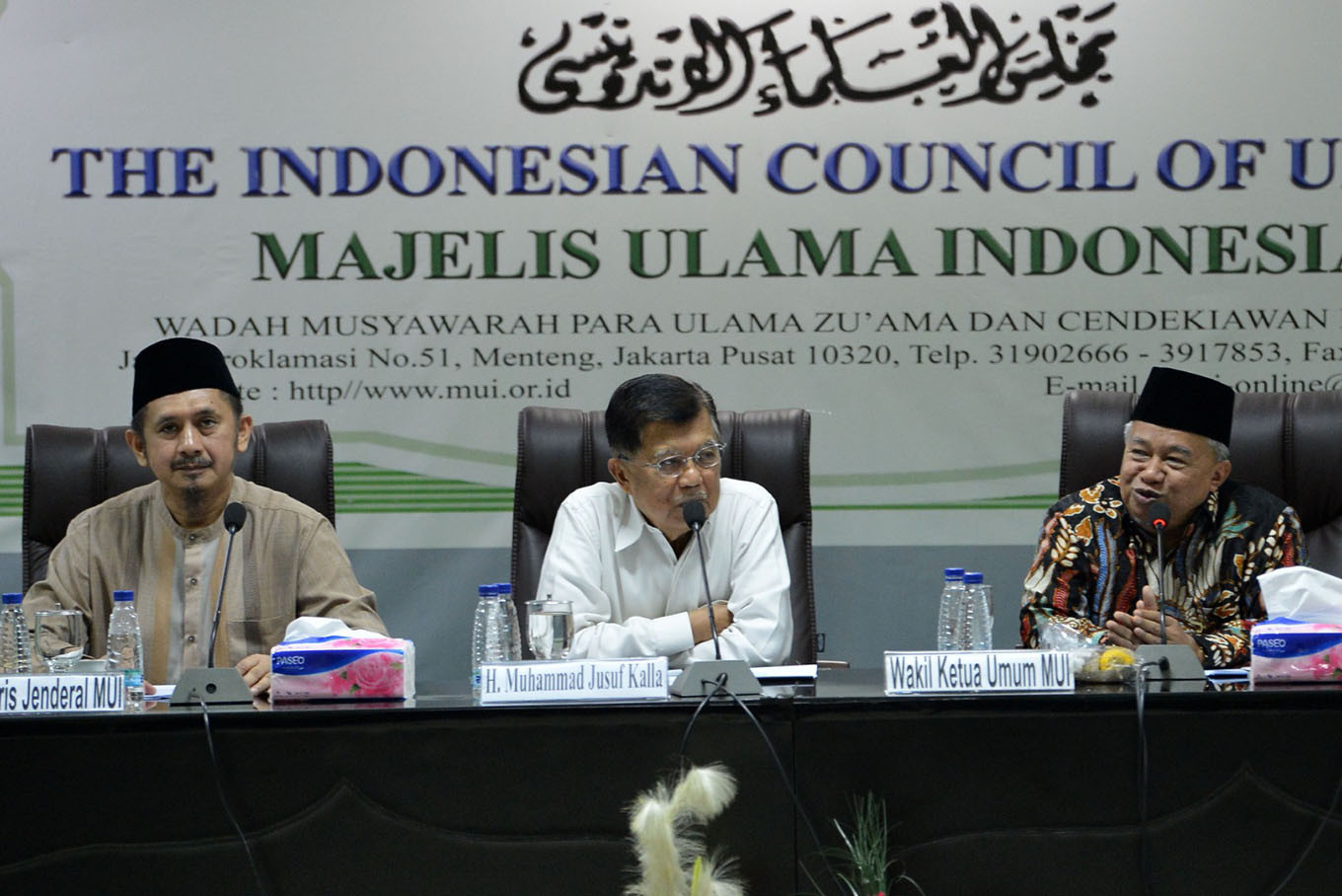Popular Reads
Top Results
Can't find what you're looking for?
View all search resultsPopular Reads
Top Results
Can't find what you're looking for?
View all search resultsIndonesian Ulema Council urges govt to map COVID-19 prone areas to support fatwa on mass prayers
“What is important is that the council realizes the situation is dangerous [...] pilgrims and Muslims must be vigilant and must prevent [the spread of the virus] in the regions,” said Indonesian Mosque Council chairman Jusuf Kalla, adding that government should specify the COVID-19 risk levels in different areas of the country to support the implementation of the fatwa.
Change text size
Gift Premium Articles
to Anyone
 MUI Deputy Chairperson Muhyiddin Junaidi (right) together with Chairperson of the Indonesian Mosque Council (DMI) Jusuf Kalla (center) and MUI Wasekjen Zaitun Rasmin delivered a press statement related to Fatwa Number 14 of 2020 regarding the organization of worship in the COVID-19 outbreak situation in Jakarta on Tuesday, March 17, 2020. The MUI fatwa regulates including allowing the public to replace Friday prayers with Zuhr prayers to prevent the spread of COVID-19 for healthy people and temporarily prohibit the conduct of worship which makes mass concentration for Muslims in areas where the corona virus spread is out of control. (Antara/Aditya Pradana Putra)
MUI Deputy Chairperson Muhyiddin Junaidi (right) together with Chairperson of the Indonesian Mosque Council (DMI) Jusuf Kalla (center) and MUI Wasekjen Zaitun Rasmin delivered a press statement related to Fatwa Number 14 of 2020 regarding the organization of worship in the COVID-19 outbreak situation in Jakarta on Tuesday, March 17, 2020. The MUI fatwa regulates including allowing the public to replace Friday prayers with Zuhr prayers to prevent the spread of COVID-19 for healthy people and temporarily prohibit the conduct of worship which makes mass concentration for Muslims in areas where the corona virus spread is out of control. (Antara/Aditya Pradana Putra)
T
he Indonesian Ulema Council has urged the government to map coronavirus diseases (COVID-19) prone areas following its issuance of a fatwa that advises Muslims to avoid praying in congregations, including for Friday prayers.
On Monday, the MUI issued the fatwa on compulsory Muslim prayers during the COVID-19 pandemic. The council advised Muslims in areas where COVID-19 had spread “uncontrollably” to not “perform Friday prayers in those areas until the situation returns to normal”.
“The fatwa should be a guide for the government to take actions and map areas where the disease has spread uncontrollably. The government is the one with the competency and authority in this matter,” MUI fatwa commission chairman Hasanuddin Abdul Fatah said during a meeting in Jakarta on Tuesday.
He also said that other religious activities, such as Quran study groups, should be suspended for the meantime in areas with a high risk of COVID-19 contagion.
The meeting at the MUI central headquarters was held to formally give the fatwa to Indonesian Mosque Council chairman Jusuf Kalla. The MUI previously announced the fatwa to the public and issued a circular to mosques.
“What is important is that the council realizes the situation is dangerous [...] pilgrims and Muslims must be vigilant and must prevent [the spread of the virus] in the regions,” said Kalla, who is also a former vice president, adding that government should specify the COVID-19 risk levels in different areas of the country to support the implementation of the fatwa.
Read also: In Jakarta, religious communities adjust traditions to prevent COVID-19
As of Tuesday, there were 172 confirmed cases of COVID-19 in Indonesia, with nine patients having recovered and five having died. Cases have been confirmed in eight provinces, namely Jakarta, Central Java, West Java, Banten, Yogyakarta, Bali, West Kalimantan and North Sulawesi.
Members of the council also asked Kalla, as the chairman of the Indonesian Red Cross, to help increase medical capacities across the country, especially isolation chambers.
Despite its status as an independent body for Indonesian clerics, the MUI, whose chairman is Vice President Ma’ruf Amin, has close ties with the administration. The MUI’s deputy chairman, Zainut Tauhid Sa’adi, is also the deputy religious affairs minister.
The MUI fatwa states that Muslims in areas "less affected" by COVID-19 could still perform Friday prayers at mosques. However, people are encouraged to minimize their physical contact by bringing their own prayer mat to the congregation, in addition to washing their hands routinely.
Friday prayers are often seen as obligatory, especially for Muslim men, and need to be performed with a congregation inside a mosque. Eid prayers and tarawih (evening prayers during Ramadan), however, are sunnah, meaning those who perform them are rewarded and not punished if they ignore them.
Read also: Hong Kong church streams mass online to prevent coronavirus spread
The MUI also prohibits Muslims who have tested COVID-19 positive from attending congregation prayer at mosques, including Friday and Eid prayers as well as tarawih. The council has also instructed them to replace the obligatory Friday prayers with zuhr (midday) at home.
"It is haram [forbidden under Islamic law] for a [person with] COVID-19 to carry out sunnah activities that create opportunities for contagion, such as performing the daily prayers in a congregation, the tarawih and the Eid prayer at mosques and other public places, as well as attending public [Quranic] recitations or majelis taklim [Quran study groups],” the fatwa read.
The statement released along with the fatwa also said that bathing rituals for the bodies of the dead should be carried out by medical authorities in compliance with their protocols and with regard to Islamic law, but that funeral prayers and burials should be conducted with extra precautions in order to avoid exposure to COVID-19.
The fatwa council also stated that actions that cause panic and/or public losses, such as hoarding basic necessities and face masks, were also haram.(mfp)








